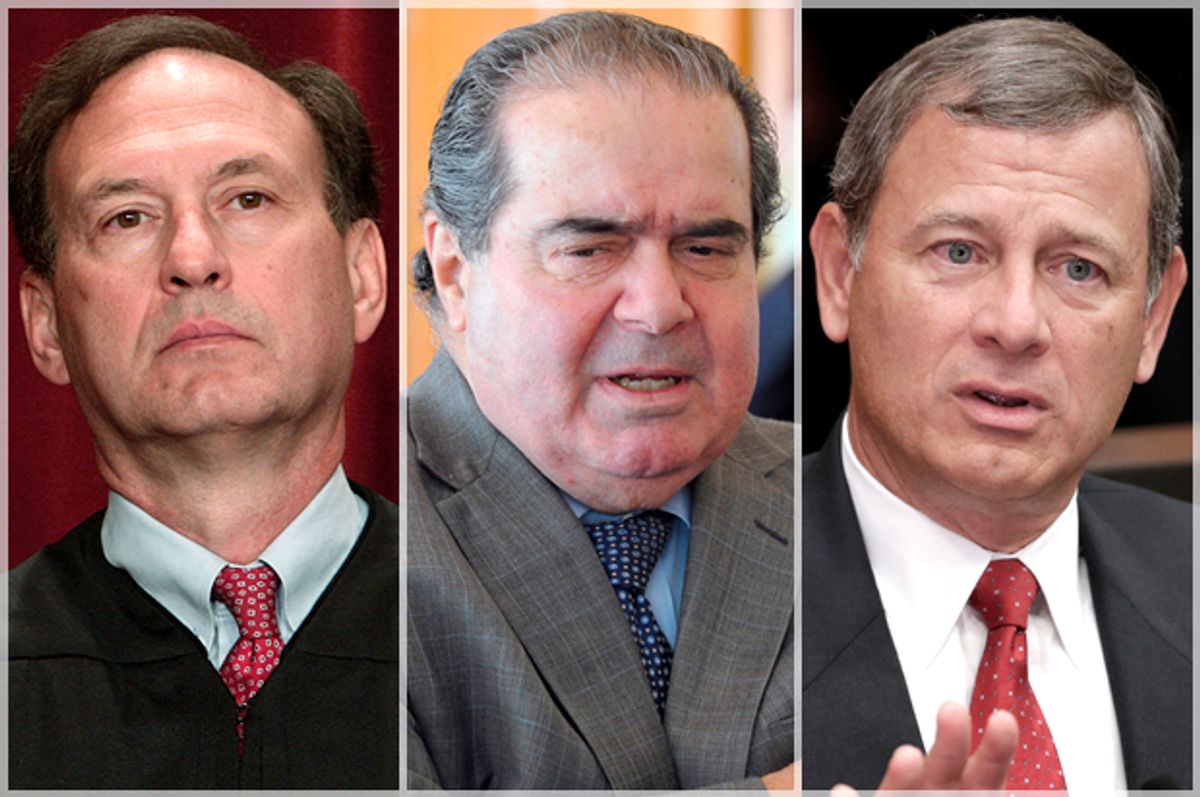Yesterday, the Supreme Court heard from lawyers for three Oklahoma death row inmates who claimed that the state's untested drug cocktail could cause their clients to feel unconstitutional pain and suffering during their executions, the New York Times' Erik Eckholm reported.
The conservatives on the court were unconvinced by the lawyers' claims that the sedative midazolam, used in Oklahoma executions last year, was incapable of producing the state of unconsciousness required for an execution to pass constitutional muster.
Samuel Alito urged everyone to just "be honest about what's going on here," noting that "executions can be carried out painlessly," and that that the real question is whether it is "appropriate for the judiciary to countenance what amounts to a guerrilla war against the death penalty which consists of efforts to make it impossible for the states to obtain drugs that could be used to carry out capital punishment with little, if any pain."
The liberal members of the court -- especially Justices Elena Kagan and Sonia Sotomayor -- were more willing to hear about the uncertainty in the medical literature about the effectiveness of midazolam. "Suppose that we said we’re going to burn you at the stake, but before we do, we’re going to use an anesthetic of completely unknown properties and unknown effects," Kagan argued, suggesting that she would support the use of a barbiturate with a proven record of rendering an inmate suitably unconscious. "Maybe you won’t feel it, maybe you will. We just can’t tell. And you think that would be OK?"
Justice Alito responded by asking the lawyers for the inmates "if an anesthesiologist rendered a person completely unconscious, and then the person was burned alive, would that be cruel and unusual punishment?" He and the lawyers for the condemned Oklahoma inmates then discussed what, exactly, would be required for someone to be burned alive in a matter that didn't violate the Constitution.
"You think there are circumstances in which burning somebody at the stake would be consistent with the Eighth Amendment?" Alito asked.
"The founders say burning at the stake is unconstitutional. It’s cruel and unusual [punishment]," one of the lawyers replied. "But in your hypothetical, if there was a way to ensure that that was done in a humane way, there could perhaps be [a way to do it consistent with the Eighth Amendment.]"
Justice Antonin Scalia chimed in, stating that the court's liberals know the reason that reliable barbiturates weren't being used is "because the abolitionists have rendered it impossible...The states have gone through two different drugs, and those drugs have been rendered unavailable by the abolitionist movement."
Justice Anthony Kennedy, considered by legal observers to be the swing vote in this decision, seemed to be siding with the court's conservatives when he asked "what bearing, if any, should we put on the fact that there is a method, but that method is not available because of opposition to the death penalty?"
The scarcity of barbiturates suitable for use in execution is, as Scalia argued, in large part because the manufacturers of these drugs don't want their products to be associated with executions. States have turned to alternative drug sources of dubious legality -- like out-of-state compound pharmacies -- as well as reintroducing older methods of execution, including the electric chair and, in Utah, the firing squad.
As Chief Justice John Roberts noted, it's difficult to believe those methods would be tenable anymore, as there is "a reason that the states moved progressively to what I understand to be more humane methods of execution."

Shares